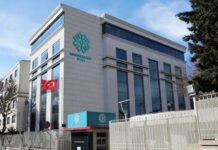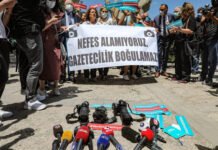Spying scandal that involved Turkish imams and other Turkish state officials who were accused of profiling critics and opponents of Turkey’s president abroad has now reached to African country of Nigeria. A Nigerian civil society organization has alerted country’s official authorities over Turkish government’s alleged spying activities in the country.
According to a report by Nigeria’s influential Leadership newspaper, the Center for Qur’anic Reciters of Nigeria has raised the alarm over alleged plans by the Turkish government to register Maarif Foundation, which will among other actors, be used as an espionage agency.
The Kano-based Islamic group also cautioned the Kingdom of Saudi Arabia against its planned involvement with Turkish President Recep Tayyip Erdogan in the setting up of the Maarif Foundation in some Muslim countries, saying such a body could end up as a vehicle for spreading intolerance and extremism in the world.
According to the report, the general secretary and CEO of the center, Sheikh Goni Sanusi Abubakar, alleged in a statement issued in Abuja that beyond its declared mission, the incorporation of the Maarif Foundation in Nigeria will take over foreign investments of Turkish nationals with whom the government of Turkey politically disagrees with, pointing out that though it may appear harmless on the surface, with the stated intention of granting scholarships to Muslims from poor homes to gain acceptance, its real intentions were beyond that.
“It was courtesy of this culture of intolerance that clerics in Turkey instigated Muslim youths to rise against Christians and ensure Christmas and New Year were not celebrated in that country. This led to the massacre on New Year’s Eve in İstanbul, with tens of innocent people losing their lives. This, clearly, is against the teaching of Islam, a religion of peace, who’s Holy Prophet embraced Christians and lived in absolute peace with them.”
“If Nigeria allows Maarif or any such group in whatever nomenclature into Nigeria, chances are that the culture of intolerance that will be induced could well make Boko Haram a child’s play. This may sound far-fetched, but then 10 years ago, nobody thought Boko Haram was going to grow to become the big monster it has become.”
The center also accused Turkey of undermining Nigeria’s sovereignty by engaging in acts of espionage through the imams of Diyanet, which is Turkey’s controversial Directorate of Religious Affairs. It is alleged in the statement that on the directives of the Turkish government, Diyanet has been engaging in spying activities through some imams in Nigeria, Germany and 36 other countries.
“Whereas this criminal activity is purportedly aimed at tracking the activities of the followers of the Gülen movement, inspired by the teachings of US-based Islamic cleric, Fethullah Gulen, chances are that Turkey will leverage on that fact to partake in other acts of espionage that may undermine or threaten our national interest.
Since, Fethullah Gülen and the movement have been a vocal critic of Turkish government and President Recep Tayyip Erdogan on corruption as well as Ankara’s aiding and abetting of radical groups in Syria. Erdogan launched a witch-hunt persecution against Gülen and his followers in December 2013 right after major corruption probe that incriminated Erdogan’s family members.
The center has also urged Nigeria and other African countries to waste no time to start investigations about Turkey’s spying activities. “It is our hope that the Nigerian authorities will take this warning seriously and act with the needed dispatch, before it gets late,” Abubakar emphasized.
However, Turkey’s ambassador to Nigeria made a statement to Turkey’s official media on Tuesday and denied claims that agencies linked to the Turkish government were involved in spying in the African state. Hakan Çakıl, Turkey’s Ambassador in Abuja claimed that “Turkey cares about its political and economic relations with Nigeria and therefore does not take any action that would harm relations between the two countries.”
Last month, the Federal Public Prosecutor’s Office (GBA) in Germany launched an investigation into Turkish intelligence operations on German soil after a lawmaker filed a criminal complaint. The spying involved Turkish imams sent by Ankara and police teams on Wednesday raided the apartments of four imams in North Rhine-Westphalia and Rhineland-Palatinate who are suspected of acting as informants on sympathizers of the Gülen movement.
The GBA said in a statement that the Turkish imams had acted on an order issued on Sept. 20 of last year by the directorate to profile Gülen movement sympathizers. Austria is also investigating whether Turkey has been operating an informer network targeting Gülen followers on its soil, via its embassy in Vienna.
In December, Ankara had to recall Yusuf Acar, the religious attaché of the Turkish government in the Netherlands, who recently admitted to spying on followers of Gülen movement. The Dutch Telegraaf daily published the remarks of Acar, who admitted that he had collected the names of people who sympathize with Turkish cleric Gülen and passed it on to Turkish government
“As an attaché, I collected information that anyone can find on the Internet,” he said to the newspaper. He said he found the information on alleged members of “FETÖ” in the Netherlands. The Dutch government called spying activities an “unwanted and non-acceptable interference in the lives of Dutch citizens.”
Turkish president vowed to pursue members of Gülen movement abroad no matter where they are, shut down all institutions affiliated with the movement and jailed over 45,000 people in the last six months alone. Erdogan labelled the movement as ‘FETÖ’, a terrorist organization, although Gülen, 75-year old cleric, and his followers have never advocated violence but rather remained staunchly opposed to any violence, radicalism and terror in the name of religion.
Erdogan has also blamed the failed coup bid last year to Gülen but failed to present any direct evidence linking the cleric to the attempt. Gülen himself strongly denied any involvement. Many believe Erdogan staged the failed coup himself to set up his critics for a mass persecution and as a pretext to transform secular parliamentary democracy to political Islamist autocracy.
Feb. 21, 2017





![[UPDATE] French journalist detained in İstanbul during protests released](https://stockholmcf.org/wp-content/uploads/2026/01/raphael_boukandra-218x150.jpg)









